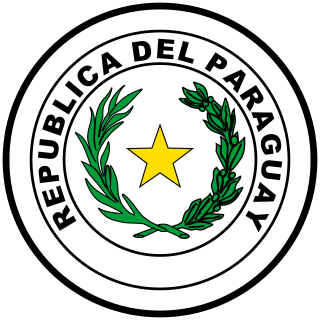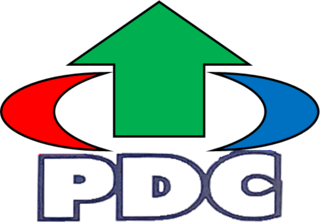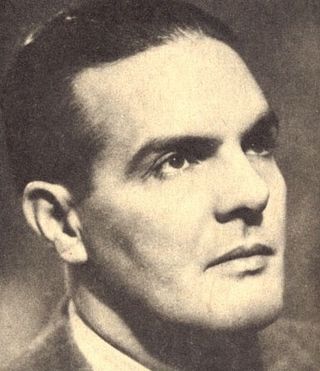
The National Republican Association, also known as the Colorado Party, is a conservative political party in Paraguay, founded on 11 September 1887 by Bernardino Caballero. Since 1947, the colorados, as they are known, has been dominant in Paraguayan politics and has controlled the presidency since 1948 –notwithstanding a brief interruption between 2008 and 2013– as well as having a majority in both chambers of Congress and department governorships.

Higinio Nicolás Morínigo Martínez was a Paraguayan military officer and politician who served as the 35th president of Paraguay from 1940 to 1948, ruling as a military dictator.
The Liberal Party of Cuba, was one of the major political parties in Cuba from 1910 until the Cuban Revolution in the late 1950s, when it was exiled.

The Authentic Radical Liberal Party is a liberal and radical political party in Paraguay. The party is a full member of Liberal International. The liberales, as they are known, are the leading opposition to the dominant conservative Colorado Party. They have taken this position since the end of the Alfredo Stroessner dictatorship in 1989. They are the political successors of the Liberal Party, which traces its history back to 10 July 1887.
The Paraguayan Civil War was a civil war in Paraguay that lasted from 7 March to 20 August 1947.
The Democratic Party is a centre-right political party in Bulgaria led by Alexander Pramatarski. The party was a member of the European People's Party (EPP).

Rafael de la Cruz Franco Ojeda was a Paraguayan military officer, politician and statesman who served as President of Paraguay after the February Revolution, from February 20, 1936, to August 13, 1937. He was the historical leader and founder of the National Revolutionary Party.

The National Encounter Party is a political party in Paraguay.

The Liberal Party, commonly known as the Blue Party, was a political party in Paraguay, ruling the country for most of the period between 1904 and 1940.

General elections were held in Paraguay on 11 February 1968. Alfredo Stroessner of the Colorado Party won the presidential elections, whilst the Colorado Party won 20 of the 30 seats in the Senate and 40 of the 60 seats in the Chamber of Deputies. Voter turnout was 73%.

General elections were held in Paraguay on 9 May 1993. They were the first free elections in the country's 182-year history, the first with no military candidates since 1928, and the first since the adoption of a new constitution the previous summer. The presidential election was the first regular presidential election since the overthrow of longtime leader Alfredo Stroessner in 1989; incumbent Andrés Rodríguez was in office by virtue of winning a special election for the remainder of Stroessner's eighth term.

Constitutional Assembly elections were held in Paraguay on 6 February 1977. The Colorado Party was the only party to contest the elections amidst an opposition boycott, and won all seats. Voter turnout was 82.8%. Following the election, the constitution was amended to scrap term limits, allowing President Alfredo Stroessner to contest the 1978 elections.
The Radical Liberal Party was a political party in Paraguay. It was the largest legal opposition group during the Stroessner regime, but disappeared soon after he was overthrown.

The Christian Democratic Party is a political party in Paraguay.

The Paraguayan Humanist Party was a political party in Paraguay.
The Unified Radical Liberal Party was a political party in Paraguay. It contested the 1989 general elections that followed the overthrow of Alfredo Stroessner, but received just 3,476 votes (0.3%) and failed to win a seat. The party did not contest any further elections.

Gustavo Machado Morales was a Venezuelan politician and journalist, editor of the Communist Party of Venezuela's newspaper from 1948 to 1983 and President of the party from 1971 to 1983. As a leading Communist, he spent a substantial part of his life in exile or in prison. He was a founder member of the Venezuelan Revolutionary Party in February 1927, a forerunner of the Communist Party of Venezuela. He was a member of the Generation of 1928 - activists opposing the dictatorship of Juan Vicente Gómez. During the 1945-8 democratic period he was a member of the Constituent Assembly and a candidate in the 1947 presidential election for the Communist Party. He was elected to the Venezuelan Chamber of Deputies four times, serving there for fifteen years.

The dictatorship of Alfredo Stroessner, colloquially known as the Stronismo or Stronato, was the period of almost 35 years in the history of Paraguay in which army general Alfredo Stroessner ruled the country as a de facto one-party state under an authoritarian military dictatorship, from 15 August 1954 to 3 February 1989.

The February Revolution in Paraguay was a military coup d'état on February 17, 1936, that brought to power colonel Rafael Franco. The revolution marked the end of Liberal Party rule in Paraguay and started the ascendancy of military dictatorships that lasted for more than half a century.













